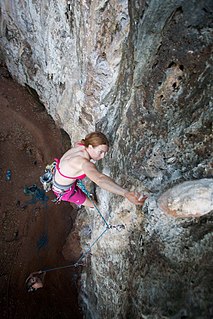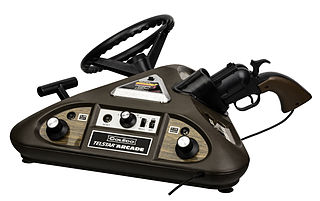
TwixT is a two-player strategy board game, an early entrant in the 1960s 3M bookshelf game series. It became one of the most popular and enduring games in the series. It is a connection game where players alternate turns placing pegs and links on a pegboard in an attempt to link their opposite sides. The rules are simple but the strategy complex, so young children can play it, but it also appeals to adults. The game has been discontinued except in Germany.

A quickdraw is a piece of climbing equipment used by rock and ice climbers to allow the climbing rope to run freely through bolt anchors or other protection while leading.

This glossary of climbing terms is a list of definitions of terms and jargon related to rock climbing and mountaineering. The specific terms used can vary considerably between different English-speaking countries; many of the phrases described here are particular to the United States and the United Kingdom.

A wide range of equipment is used during rock or any other type of climbing that includes equipment commonly used to protect a climber against the consequences of a fall.
In chess, a draw by (mutual) agreement is the outcome of a game due to the agreement of both players to a draw. A player may offer a draw at any stage of a game; if the opponent accepts, the game is a draw. The relevant portion of the FIDE laws of chess is article 9.1. The vast majority of drawn chess games at the amateur club/tournament level and higher are draws by mutual agreement rather than the other ways a game can be drawn.

Sport climbing is a form of rock climbing that may rely on permanent anchors fixed to the rock for protection, in which a rope that is attached to the climber is clipped into the anchors to arrest a fall, or that involves climbing short distances with a crash pad underneath as protection. This is in contrast to traditional climbing where climbers must place removable protection as they climb. Sport climbing usually involves lead climbing and toproping techniques, but free solo and deep-water solo climbing on sport routes is also sometimes possible.

Lead climbing is a climbing style, predominantly used in rock climbing. In a roped party one climber has to take the lead while the other climbers follow. The lead climber wears a harness attached to a climbing rope, which in turn is connected to the other climbers below the lead climber. While ascending the route, the lead climber periodically connects the rope to protection equipment for safety in the event of a fall. This protection can consist of permanent bolts, to which the climber clips quickdraws, or removable protection such as nuts and cams. One of the climbers below the lead climber acts as a belayer. The belayer gives out rope while the lead climber ascends and also stops the rope when the lead climber falls or wants to rest.
Draw, drawing, draws, or drawn may refer to:

Wild & Crazy Kids is an American television game show in which large teams, usually consisting entirely of children, participated in head-to-head physical challenges on Nickelodeon. The show lasted for three seasons from 1990 until 1992 for a total of 65 episodes. Wild & Crazy Kids starred three teenage co-hosts Omar Gooding and Donnie Jeffcoat in all three seasons, accompanied by Annette Chavez in season 1 and Jessica Gaynes for the last two seasons.
Fast draw, also known as quick draw, is the ability to quickly draw a handgun and accurately fire it upon a target in the process. This skill was made popular by romanticized depictions of gunslingers in the Western genre, which in turn were inspired by famous historical gunfights in the American Old West.
Speed is a game for two players or more of the shedding family of card games, in which each player tries to get rid of all of his or her cards first.

Gunfright is an action-adventure game developed by Ultimate Play the Game and published by U.S. Gold. It was first released for the ZX Spectrum in December 1985, then released for Amstrad CPC and the MSX the following year. The player takes the role of a sheriff in the town of Black Rock and is tasked with eliminating outlaws who are scattered throughout the settlement.

Tin Star is a shoot 'em up video game developed by Software Creations and released by Nintendo for the Super Nintendo Entertainment System (SNES) in North America in November 1994. Starring anthropomorphic robot characters, it follows a seven-day adventure of the titular sheriff who fights the criminal Bad Oil Gang from taking over the town of East Driftwood. Tin Star includes both third and first-person stages, and players can control the reticle either with a standard Super NES controller, Super Scope or the SNES Mouse. Tin Star was the third Software Creations-developed game to be published by Nintendo, after Ken Griffey Jr. Presents Major League Baseball (1994) and Plok! (1993) Critics' reviews for Tin Star were generally positive, with praises towards the presentation but criticism against the monotonous gameplay and lack of challenge.

Todd Nauck is an American comic book artist and writer. Nauck is most notable for his work on Friendly Neighborhood Spider-Man,Young Justice and his own creation, Wildguard.

Richard McGraw was an American professional wrestler, best known for his appearances with the World Wrestling Federation (WWF) under the ring name "Quickdraw" Rick McGraw in the late 1970s and early 1980s. Rick was a wrestler at Elon College 1973-74

Quick Draw McGraw is a fictional anthropomorphic horse and the protagonist and title character of The Quick Draw McGraw Show. He's a white horse, wearing a red cowboy hat, a red holster belt, and a light blue bandana. He was voiced by Daws Butler. All 45 of his cartoons that originally aired between 1959 and 1961 were written by Michael Maltese, known best for his work at the Warner Bros. cartoon studio. The cartoon was nominated for an Emmy Award in 1960.

Michael Forever – The Tribute Concert was a music benefit concert which was held on 8 October 2011 at the 74,500 seater Millennium Stadium in Cardiff, the capital of Wales.

Quick, Draw! is an online game developed by Google that challenges players to draw a picture of an object or idea and then uses a neural network artificial intelligence to guess what the drawings represent. The AI learns from each drawing, increasing its ability to guess correctly in the future. The game is similar to Pictionary in that the player only has a limited time to draw. The concepts that it guesses can be simple, like 'foot', or more complicated, like 'animal migration'. This game is one of many simple games created by Google that are AI based as part of a project known as 'A.I. Experiments'.

The Coleco Telstar Arcade, commonly abbreviated as Telstar Arcade, is a first-generation home video game console that was released in 1977 in Japan, North America and Europe by Coleco. It is the most advanced video game console in the Coleco Telstar series, based on the MOS Technology MPS-7600-00x chips series. Each of these chips is a full microcontroller with 512 ROM area.














